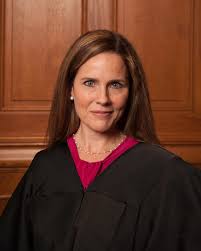ANALYSIS-U.S. Supreme Court's rightward move could benefit oil and gas interests
"This one is being watched," said Michael Lennon, another Mayer Brown partner, though attempts to sue energy companies under the Alien Tort Statute "have not generally gone anywhere." Trump's administration has faced lawsuits over its regulatory rollbacks and efforts to fast-track oil and gas projects, winning 22 such cases but losing 119, according to New York University's Center for Policy Integrity.

- Country:
- United States
The addition of Amy Coney Barrett to the Supreme Court, moving it further rightward, could have significant consequences for U.S. climate change policy and complicate the government's ability to regulate pollution, according to legal experts.
The confirmation of President Donald Trump's nominee in the Republican-led Senate, expected on Monday after the Judiciary Committee voted in favor of Barrett on Thursday, would give the Supreme Court a 6-3 conservative majority. That ideological leaning could make the court even more favorable toward oil and gas interests and could come into play in environmental cases as the justices resolve disputes involving climate policy and Trump administration rollbacks of environmental regulations, experts said.
Barrett did not establish much of a record on environmental cases in three years on the Chicago-based 7th U.S. Circuit Court of Appeals. Trump has championed regulatory rollbacks to free the energy and auto industries from costs.
Joe Biden, the Republican president's Democratic opponent in the Nov. 3 presidential election, favors restoring energy regulations aimed at protecting public health and the environment, and shifting America's electricity generation and transportation away from climate-polluting fossil fuels. "It's not difficult to predict that we are going to see increasing amounts of energy litigation that will bubble its way up to the Supreme Court - no matter who wins," said energy litigation expert Brad Thompson, an Austin, Texas-based partner at the law firm Duane Morris.
Barrett raised concerns among environmentalists during her confirmation hearing last week by refusing to give her views on climate change and whether human activities were contributing to it. Barrett called it a "very contentious matter of public debate" while environmentalists point to an overwhelming scientific consensus that industrial activity is warming the planet. "Folks who care about the environment will realize it is an uphill battle to protect the environment under a 6-3 SCOTUS," said Sam Sankar of the legal nonprofit Earthjustice, using shorthand for the Supreme Court.
If elected, Biden could seek legislation to limit emissions and punish polluters, a difficult chore if Republicans retain Senate control. Biden also could use executive actions, though they are more vulnerable to court challenges. A 6-3 conservative court majority could restrict expansion of the 1970 Clean Air Act to regulate greenhouse-gas emissions from stationary sources such as power plants, said Michael Gerrard, director of Columbia Law School's Sabin Center for Climate Change Law.
Such expansion was part of Democratic former President Barack Obama's Clean Power Plan, repealed by Trump's administration. An environmental challenge to Trump's Clean Power Plan replacement is being litigated in a federal appeals court and could reach the Supreme Court. "Companies already recognize that they've got some new avenues to challenge regulations," said Nicole Saharsky, partner and co-chair of law firm Mayer Brown's Supreme Court and appellate practice in Washington.
BALTIMORE LAWSUIT If confirmed, Barrett would participate when the court hears an appeal by energy companies including BP PLC, Chevron Corp, Exxon Mobil Corp and Royal Dutch Shell contesting a lawsuit brought by the city of Baltimore seeking damages for the environmental effects of burning oil. That case focuses on a narrow procedural issue that does not address broader climate policy.
Unlike some other conservative judges, Barrett has not openly criticized the Supreme Court's 1984 Chevron v. Natural Resources Defense Council ruling establishing that judges should defer to federal agencies in interpreting law when a statute is ambiguous. Legal experts said Barrett might join court conservatives in reviving a legal doctrine limiting congressional power to delegate authority to agencies. That could frustrate efforts to allow the Environmental Protection Agency to regulate pollution.
The more that legislation requires the EPA "to fill in the blanks," the more potentially vulnerable it is in courts, Case Western Reserve University School of Law professor Jonathan Adler said. Energy companies are watching lawsuits related to the 1789 Alien Tort Statute, which lets foreign nationals sue in the United States in certain circumstances. Some recent court decisions curtailed the law's application in human rights claims against international corporations.
The Supreme Court is due to hear Dec. 1 arguments in an appeal by Cargill Inc and a Nestle SA subsidiary challenging a lower court's ruling that the food companies knowingly helped perpetuate slavery at Ivory Coast cocoa farms. "This one is being watched," said Michael Lennon, another Mayer Brown partner, though attempts to sue energy companies under the Alien Tort Statute "have not generally gone anywhere."
Trump's administration has faced lawsuits over its regulatory rollbacks and efforts to fast-track oil and gas projects, winning 22 such cases but losing 119, according to New York University's Center for Policy Integrity. Many of those losses came because agencies failed to follow required rule-making processes.
"Facts, science and the law are on the side of addressing climate change," California Attorney General Xavier Becerra, a Democrat, told Reuters.
(This story has not been edited by Devdiscourse staff and is auto-generated from a syndicated feed.)
ALSO READ
Senior US Democrat wants more answers before approving Israel F-15 sale
Infosys and Intel expand partnership to help democratize AI
Biden wins Wyoming's caucuses, with Democrats in Alaska still to get their say in the nomination
BJP's '400 paar' claim creating doubts among people about democratic process, EVMs: Kanhaiya
Joe Biden wins the Democratic presidential caucuses in Wyoming, reports AP.










